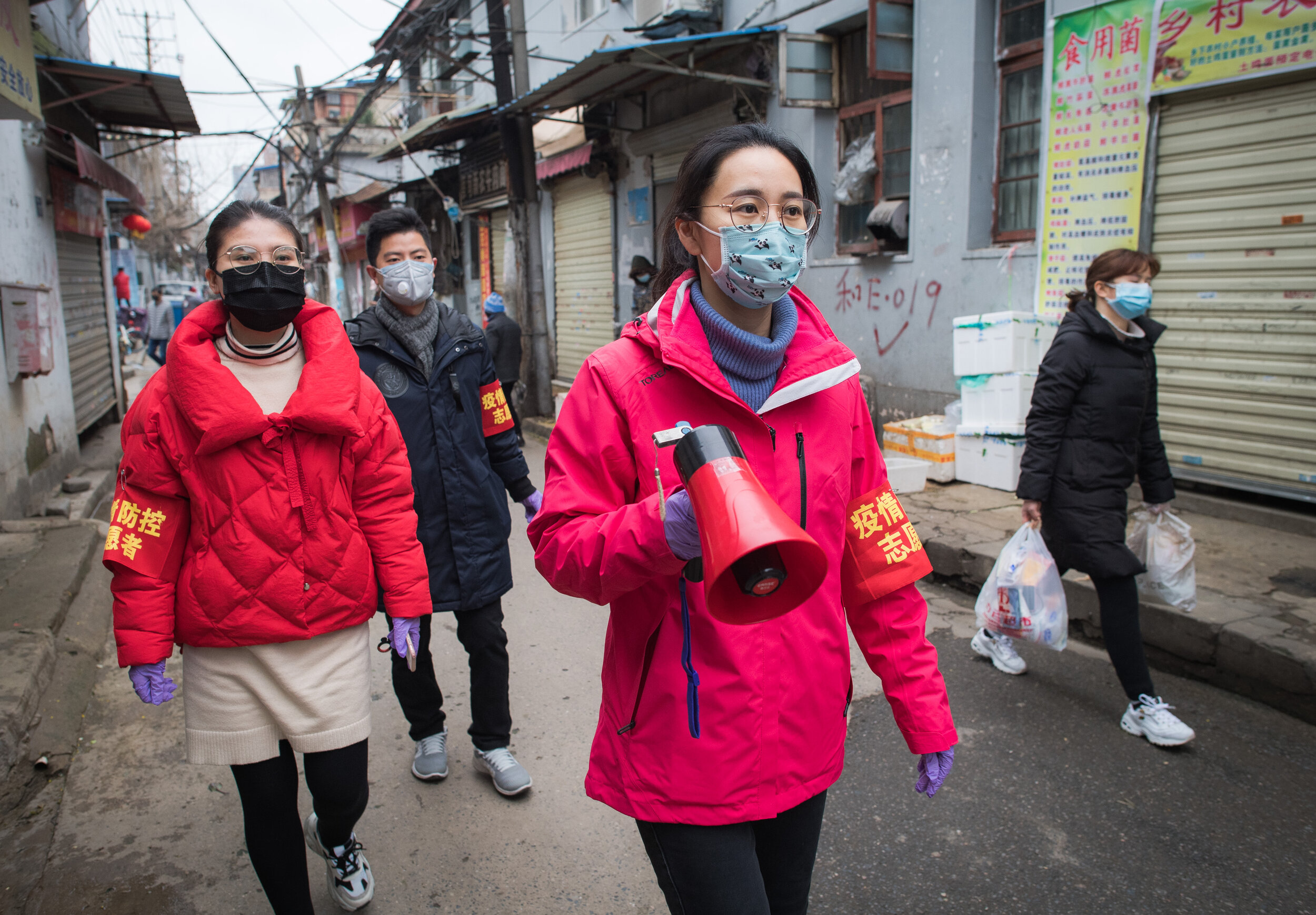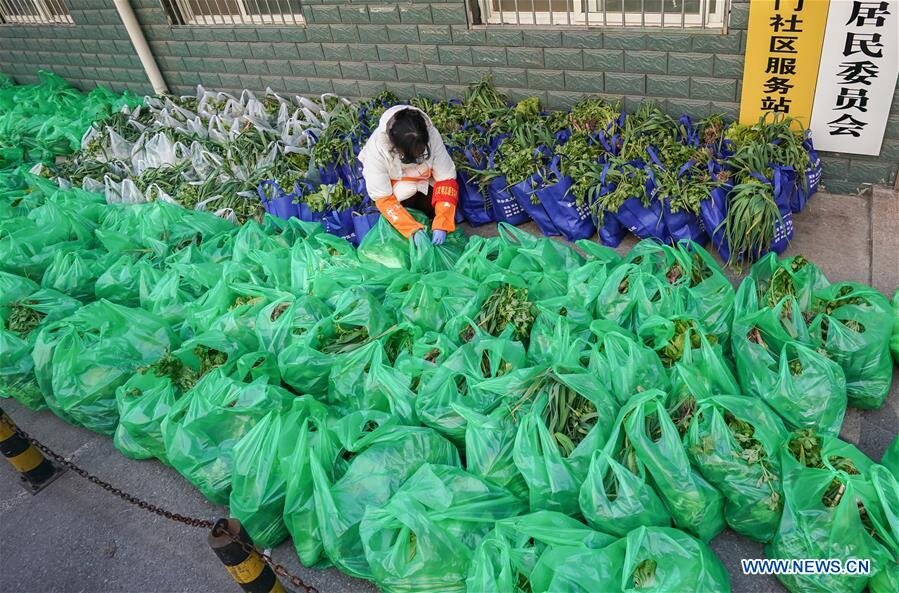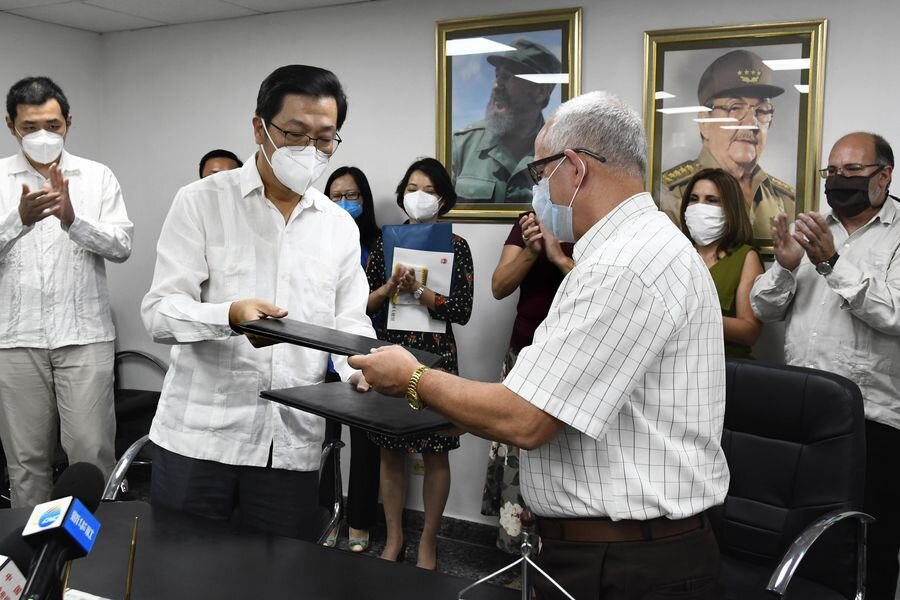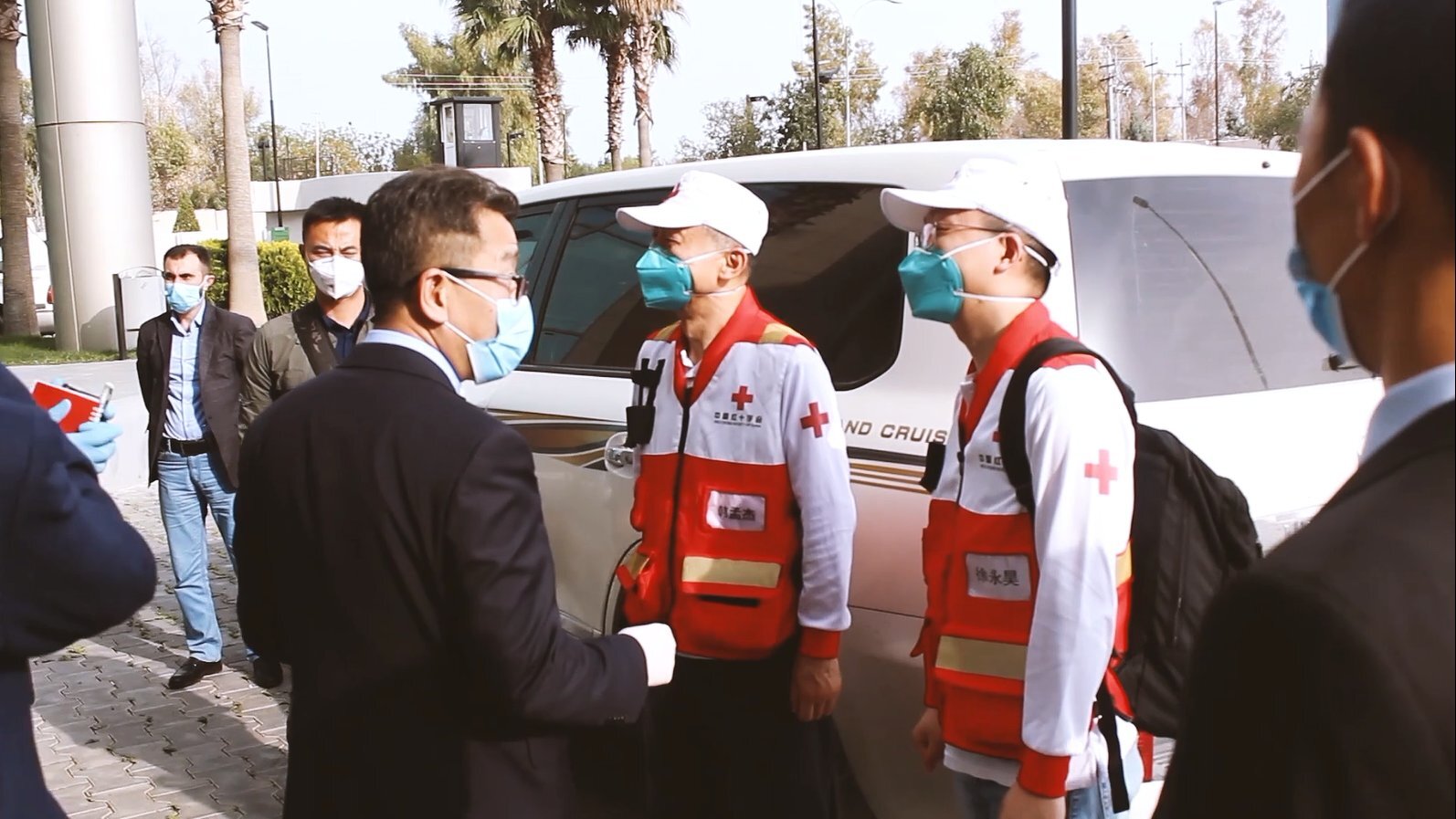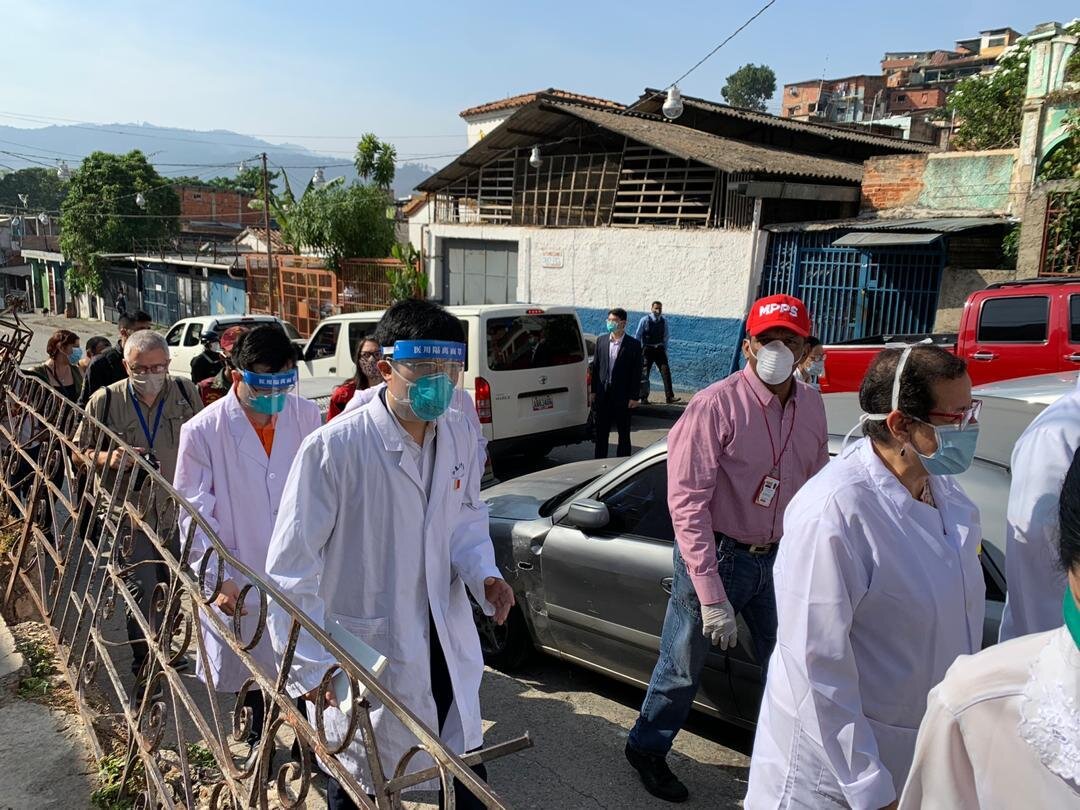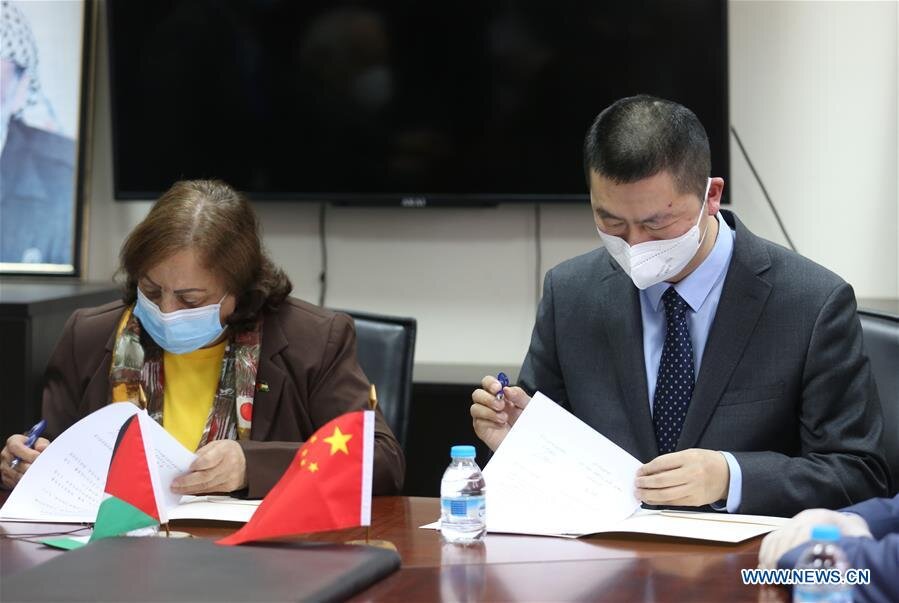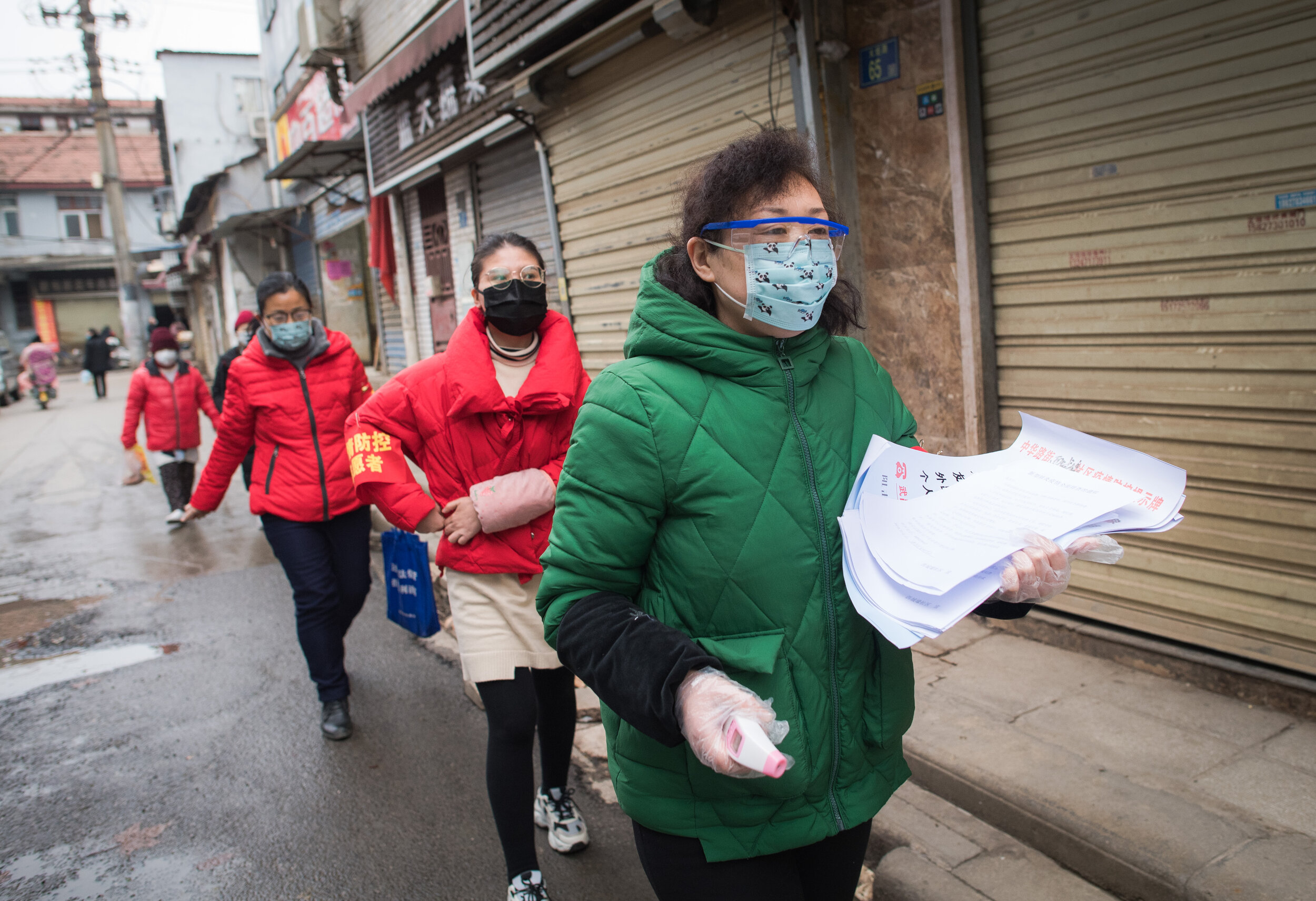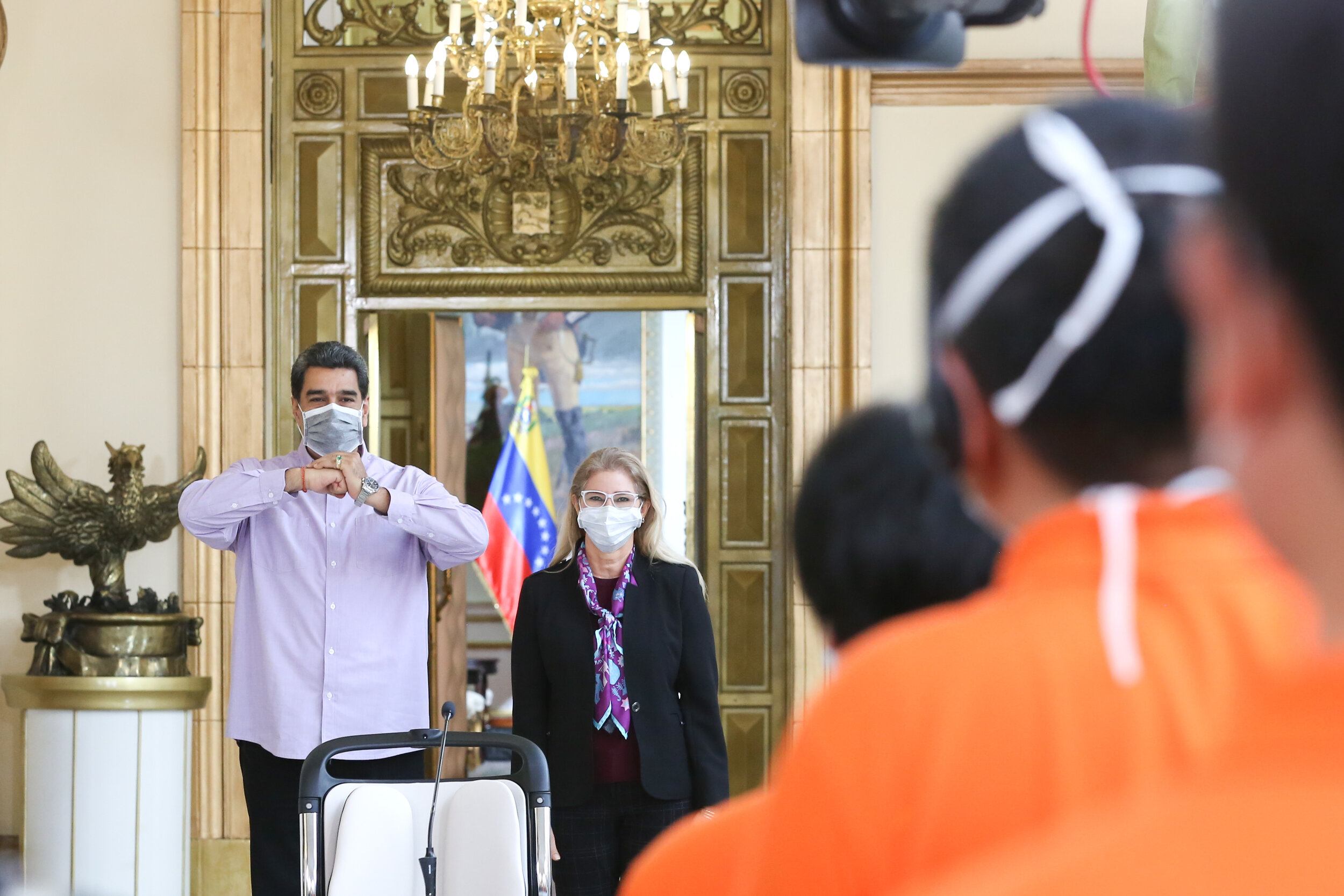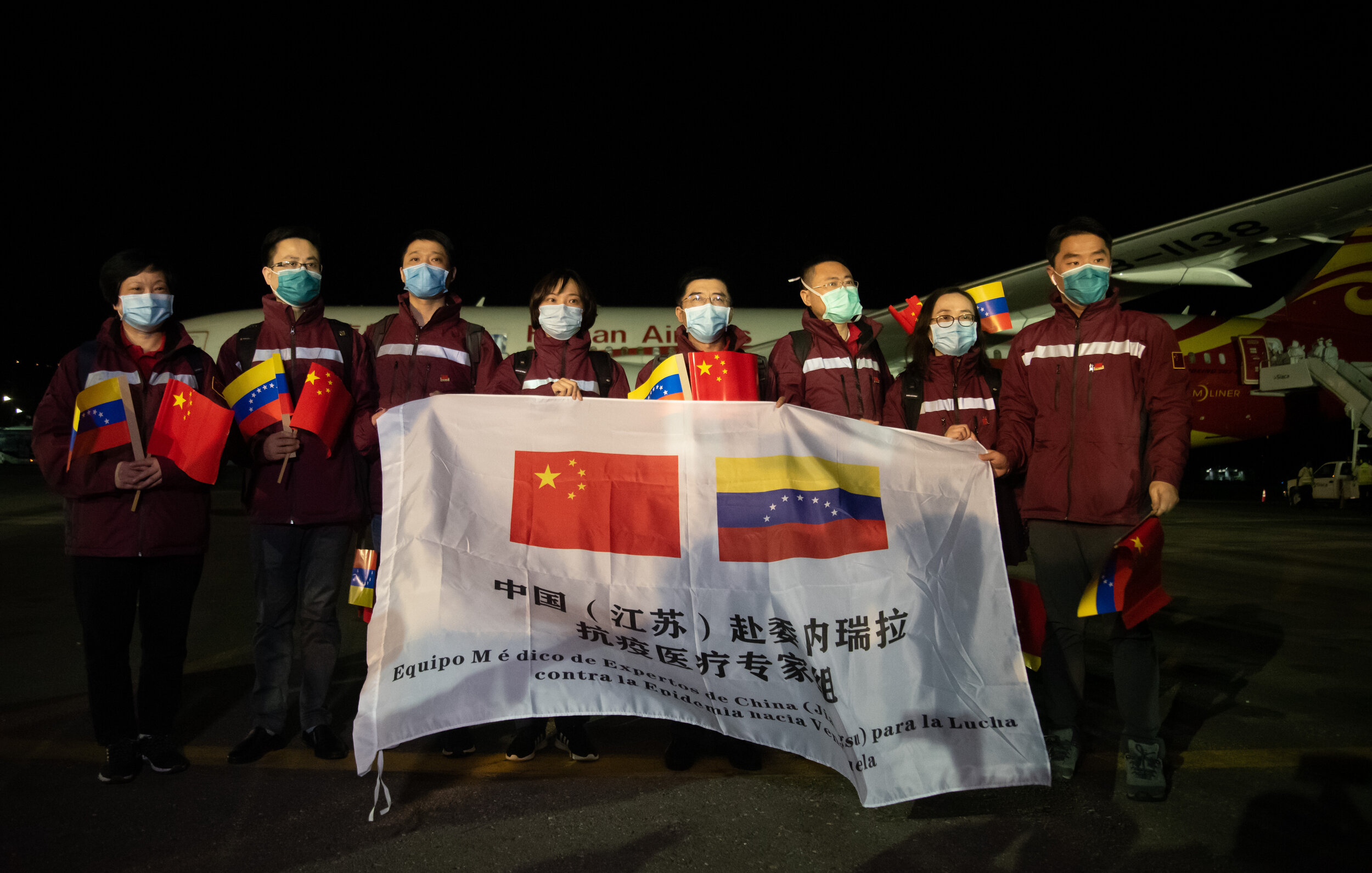“We Are Trying to Build Humanity”—Vijay Prashad on Chinese Socialism & Internationalism
Neighborhood community workers conduct door-to-door visits to ensure community prevention and control of COVID-19 at a street near the Yellow Crane Pavilion in Wuhan, Hubei. Feb. 7, 2020. (Source: Xinhua/Xiao Yijiu)
Editor’s note: Qiao Collective was honored to have a conversation with Vijay Prashad about the COVID-19 pandemic, navigating China’s road to socialism in a capitalist world-system, and what China’s push for multilateralism means for U.S. hegemony in a post-pandemic world. This transcribed interview has been edited for length and clarity.
Vijay Prashad is the director of Tricontinental, an international, movement-driven institution focused on stimulating intellectual debate that serves people’s aspirations. He is an Indian historian and journalist and the author of thirty books, including Washington Bullets, Red Star Over the Third World, The Darker Nations: A People's History of the Third World and The Poorer Nations: A Possible History of the Global South.
QIAO COLLECTIVE: Tricontinental has recently released a wonderful report titled “China and CoronaShock,” which details China’s timeline of pandemic response and corrects many misleading American news reports about China’s supposed “botched response” and its silencing of “whistleblowers.” Why did you feel it was important to offer this correction, and why do you think the U.S. government and mainstream media are doubling down on this narrative of Chinese mismanagement?
VIJAY PRASHAD: It's a very good question. I’d like to start by saying that I've personally had a long interest in epidemics and pandemics. In fact, the first published piece I ever had was on the cholera epidemic of 1832. It’s interesting because the cholera epidemic starts in Bengal, near where I was born, in 1817 and travels overland through Russia, parts of the Middle East and then eventually comes to France, Britain, and the United States. And it goes on for 100 years. You have the epidemic of 1832, the epidemic of 1848, and so on.
It's literally a hundred year journey of cholera. When it was in Russia, in the Baltic ports, the French said, “It's never going to come here because this is Asiatic cholera. Lesser humans suffer from this stuff. It doesn't impact us. We are not going to get it. Plus, we're a democracy. Not only are we Caucasians, but we're a democracy.” Of course, that damn cholera came and devastated Europe and it devastated Britain.
So I had a long interest in how these epidemics, pandemics, and diseases are racialized. The moment Trump used the phrase “Chinese virus,” I said, look, come on. You know, Mr. Trump, this is a joke, because you're returning us to a 19th century imperial narrative about a pandemic disease. You are just part of an old discourse of Asia “sending diseases.” When in fact we know that some of the worst epidemics originate in the West. The avian influenza of 1918, the so-called Spanish flu, had nothing to do with Spain. You know, poor Spain—Spain was the only country that reported the flu and therefore it became called Spanish flu. But that flu starts in Kansas. It starts in a military chicken farm. These epidemics stem from industrial farming, encroachment of forests, it’s a problem of modernity. It has nothing to do with the Chinese or Asians, this offensive way to understand this. That was the first motivation. I thought this has got to be said.
Secondly, in China, there is a debate, an understandable debate: When did you first find out about it? Was it December 26? Was it December 5th? The government itself is investigating what happened. Was there a flaw in the system and so on? That's important. When people say “China suppressed, China did this,” they see China as a monolithic entity. There is no such thing called China, friends. There is a government in which there are competing people arguing with each other. There are provincial governments. There are doctors who disagree with other doctors. I mean, it's a human society. It's not a China. You know, like the Borg, where they all think alike.
So with my colleagues [Du Xiajun and Zhu Weiyan] we decided, let's first try to establish the timeline. When did the first doctors in Hubei say, look, there's a problem here? There's an unknown influenza. What's going on? Opacity in the lungs and C.T. scans. This is unusual, et cetera, et cetera. Let's look at the timeline.
When did doctors inform the hospital administration? When did the hospital inform China’s CDC? Eventually. When did they inform W.H.O.? That was important just as an exercise.
The second question to raise is, was there a debate inside the Chinese institutions? Yes, there was a debate. It's important to register that, you know. And so that was the second thing, to highlight elements of that debate.
Were there reprimands of people? Yes, there were reprimands of people because guess what? Imagine—I'm a doctor. I see something. I put it on a WeChat account, on social media with my friends. I get reprimanded. That kind of thing happens. You know, the commanding officer of an American ship goes out and he writes a letter in his hometown newspaper or he leaks it to the news. And the Trump administration removes him from command of the ship. Is that the suppression of the story? No. He operated outside the chain of command. It's a different thing. Somebody needed to come out and make some reasonable points:
One: The Chinese medical profession, initially—in Wuhan, in Hubei—didn't know what they were facing. That’s important to establish. It's not like on the 26th of December, they knew, “Okay. This is the novel coronavirus.” I mean, they had no idea what this was. That was very important. We had to tell the story: How did they learn what this was, when they informed the Chinese CDC just three days later. The 26th of December, they have already informed the Chinese CDC.
Three days later, China CDC informed the W.H.O. On the 31st of December, the head of CDC China calls CDC USA. This is now just a matter of days. They still don't have a name for the virus. They've already informed the Americans. And you continue to say they suppressed the story. I mean, it's the basic integrity of a journalist. The head of the U.S. CDC says “I was phoned during the vacation period. The head of China, CDC, was crying on the phone to me.” This is the head of the U.S. CDC saying that this information was delivered on the 31st of December 2019.
“There is an ideological game being played here basically for two reasons. Number one, you can say China is at fault for everything.”
So why is the Associated Press saying China suppressed everything from the 14th of January to the 20th of January? How could they have suppressed it when already in early January, the W.H.O., on their Twitter account and on their website, said that there is a serious issue in Wuhan? There is an ideological game being played here basically for two reasons. Number one, you can say China is at fault for everything. Even if we screw up, if we didn't prepare, Trump didn't prepare, the Italians didn’t prepare. You know, if the Western leaders didn't prepare. Don't blame the Western leaders. Blame China. It's a very convenient thing. That’s part of it.
The other part of it is, you know, you can always pull the golden ring of racism. That's the easiest thing, to say, “look at the Chinese. They eat bizarre food. Not only do they eat dogs and pangolins and bats and God knows what.” But if you look at the scientific literature, the scientists say we don't actually know the path of transmission. You know, let's not assume it's bat, pangolin, then humans. It's not that easy. Now there's a very malicious claim being made that the Institute of Virology in Wuhan was developing the virus and then they leaked the virus. Come on. The scientific literature says there's no direct, singular explanation, but 90 percent of the media and the Trump administration, Mike Pompeo and others, are driving a hard ideological game. So it's really against that anti-scientific, highly ideological political game that the three of us authors felt it was worthwhile to write the series.
QIAO COLLECTIVE: We’re curious to hear your thoughts on how COVID-19 is shaping existing geopolitical dynamics. We’ve seen infighting and competition for scarce medical supplies between European nations, bickering between the U.S. and EU, and highly visible aid from Cuba and China in places like Italy and Spain.
What do you think about China’s role is in global geopolitics, particularly in terms of creating space for multilateral relations beyond a U.S. hegemonic world system? And how might this pandemic be shaping these trends?
VIJAY PRASHAD: First, let's go back a little bit. If you look back at this very dense period between 2001 and 2004, you have the United States going to war in Iraq, the financial turbulence of the dot com bubble, SARS striking East Asia, you’ve got East Asia barely out of the 1997 financial crisis. This is a period of great density.
“The Iraq war demonstrated to people in many of these countries that the U.S. is an out of control government.”
There was a lot of anxiety about what the Americans were doing. The Iraq war demonstrated to people in many of these countries that the U.S. is an out of control government. They went to war against Iraq, with no real concern for logical warnings. Just went and destroyed the country. Before this, China in particular had been quite reticent to join platforms of international cooperation with Third World countries. China played an interesting role in the U.N. For instance, there was a group in the 1960s called G-77, a developing country bloc. China didn't join that bloc. But it used to use all its votes with G-77, so in many resolutions, you see: “G77 plus C, G77 plus C.”
That was the case for a long time. You know, right through the Deng Xiaoping years, there was a sense that China would cooperate with these countries, but it didn’t want to be tied down through formal affiliation. So it's only after the fiasco of the Iraq war that we saw the Chinese government in international negotiations, particularly around subsidies of agricultural crops in the Global North. At the Cancun meeting in 2003, there was a debate about the world order and trade and how subsidy regimes should function. There were questions about financing for development, debates about patent exceptions for pharmaceutical drugs like AIDS drugs and so on. At that time, India, Brazil and South Africa created a bloc known as IBSA. That was the first major attempt at articulating on the global stage this theory of multipolarity. They said: we are now entering a harsh, unipolar world. The United States is driving a gangster's agenda. We need to have some air and oxygenation in the world order. And China starts coming in and getting involved in these trade negotiations, technical questions of how trade relations should be constructed, particularly around financial services. China started coming in and taking a position, getting involved with these countries.
So when eventually the BRICS bloc is formed, it’s not BRIS plus C, you know, China actually became a full fledged member of the BRICS bloc. At the same time you saw China holding these Africa-China forums in Beijing, then in parts of Africa. China became an active member in this kind of diplomatic move for multipolarity. As more right-wing governments have come to power in India and Brazil and a right-leaning government in South Africa, in recent years Chinese theorists have been talking about bipolarity. They wonder that maybe it's not going to be credible for a multipolar world to emerge, but it could be bipolar. There could be an American pole and a Chinese pole. This is a rational way to go. And maybe the Russians will have some relationship with the Chinese. So you saw a strengthening of ties with Russia, security, economic, military and so on. So this has been a longstanding practical discussion about reorienting trade and so on.
I have to say, though, that in the last 10 years, many of the attempts at creating alternative institutions—for instance, alternative banks, an alternative IMF—were unsuccessful. Many of the institutions just didn't turn up. Somebody needs to do an autopsy: why, between 2009 and 2019, was this very promising project not able to deliver things like an alternative World Bank, an alternative IMF, an alternative to the SWIFT system, so that you are not tied to a European-based money transfer system? It’s these hegemonic financial systems that block Iran and Venezuela from accessing international finance under sanctions. Why weren’t these alternative institutions built? It's a very important question. The Asian Development Bank is controlled by the Bank of Japan, which essentially pays fealty to the U.S. Treasury. It's not really an Asian Development Bank. It's a Japan-U.S. bank, it happens to be headquartered in Manila, it happens to give development aid in Asia, but it's not exactly an independent institution. Why weren't these built? That's an important question.
I think the crisis of COVID-19 has brought on the table again the issue of multipolarity. But it’s not good enough to have an emotional attitude to this. You need to understand, where are the institutions? Which institutions are you going to build? If the U.S. is walking out of UNICEF, UNESCO, UNRWA, the Palestinian agency, and now W.H.O. Will somebody come in and take care of it? Will there be another foundation?
So the question of multipolarity is not a question of just describing, “there is a rising China, a huge GDP growth rate, the West is declining.” It doesn't work like that. You've got the United States—a massive military, it controls international institutions. As long as this is the case, there is no multipolarity.
QIAO COLLECTIVE: We’ve been particularly interested in how many U.S. economic policy advisers and pundits have framed this pandemic as a consequence of “globalization gone wrong” in a way that particularly blames U.S. over-dependence on Chinese manufacturing. There’s an idea that it was a mistake to integrate China into global supply chains to the extent that the West did, and that COVID-19 is the breaking point for this relationship. What do you think this pandemic means for the future of the U.S.-China trade relationship specifically, and China’s previous role in the global economy as the “factory of the world” more generally?
VIJAY PRASHAD: So, there's three things there that I think should be said. One is, I want to contest people’s claims that “we've globalized too much and brought China into the chain”—let's look at the historical context to this. It's true that there is a relationship between pandemics and transportation networks. Obviously, if we were not connected to each other, a pandemic wouldn't happen because the definition of pandemic is that it crosses boundaries.
If there were more border controls and less aircraft, it would be harder. For instance, I said earlier that the first modern pandemic is the cholera of 1832. But if the British didn't colonize India, then they may not have caught the cholera from Bengal and brought it back to Britain. You know, too bad you guys came and colonized Bengal.
It's not a question of something new. If you take the influenza of 1918, 1919, it wrecked the world. But China was barely impacted by it. The reason is that China wasn't integrated fully into the world at the time. There were not so many railroads in China. Chinese people were not being taken out and brought back. Yes, there was indentured labor to the Caribbean, to parts of Southeast Asia and so on, but they were not going back and forth. Sixty percent of the people who died in the influenza 1918-1919 came from India. And the reason they died is because soldiers came back from WWI and those soldiers brought the influenza back to back to the ports and it devastated communities in India.
“We should push back on this idea of globalization being just a baby, just a few decades, which is nonsense. It's actually amnesia about colonialism.”
So sixty percent of global deaths took place in India compared to an almost negligible percentage in China, because there were no troops coming back from WWI and so on. So for these people to shorten the clock of globalization to 1990 to the present is trivial. Globalization in a general generic sense, is a long history of colonialism, of utilizing troops from one part of the world in another, and so on. So we should push back on this idea of globalization being just a baby, just a few decades, which is nonsense. It's actually amnesia about colonialism.
What they're talking about is the new supply chain as it's constructed with Chinese rim cities being very much part of the manufacturing section of the supply chain and so on. That's new. I agree. But let's face it, guys, if you're a German manufacturing company, a high tech company, you're going to continue to manufacture. And if not in Wuhan, then you’re going to move somewhere else but you’ll still be in China. Why? I mean, how many German workers are willing to work the way that Chinese workers work? Chinese workers have a couple of advantages. One is being highly skilled, because the rates of literacy is much higher in China than in India, in Ghana, or Brazil even. They're also much more disciplined. They've learned discipline. They're healthier. In India, there’s pandemics nonstop, it’s just not called pandemics because they cross Indian states but don’t get out of the country. So for lots of reasons, the Chinese working class is not going to be just dismissed. It's very hard to pivot out of this particular supply chain issue. Ninety percent of the vitamin C used in the U.S. comes from China. So you say, OK, let's now manufacture vitamin C in the US. How are you going to do it? Which workers are willing to go and work in a factory producing vitamin C tablets for that price?
And if you say, oh let's just eat oranges. Who's going to pick them? How many U.S. born workers are willing to take those subpar salaries to pick oranges in Florida? It's not going to happen. You know, so it's very hard to pivot to supply chain infrastructure. But also culturally, I mean, how many U.S. workers are willing to work for like six dollars an hour? You know, it's not going to happen when these firms are not interested. They're used to having large margins. So in that sense, the pivot isn't going to be that quick.
“China has been extremely wary of the fact that it is in a satanic embrace with Western markets. In many ways, the Belt and Road Initiative is a way to pivot out of Chinese dependence on the U.S. and European markets.”
But China has been extremely wary of the fact that it is in a satanic embrace with Western markets. This is a very serious problem for the Chinese government. In many ways, the Belt and Road Initiative is a way to pivot out of Chinese dependence on the U.S. and European markets. Poverty reduction is still growing the domestic market in China. But also there are these other markets, in Central Asia, in the Middle East, et cetera. There is an understanding that this satanic embrace is not tenable. China lends U.S. consumers money, who then buy Chinese goods, but most of the profit isn’t accumulated in China because so much is repatriated by the big firms. But this surplus going back and forth is ridiculous. The Chinese surplus is underwriting the fact that U.S. firms haven’t lifted wages in some 35 years.
So is China trying to advance its case? I don't think anything is that clear-cut. I think there are contradictions involved here. The Chinese establishment, intellectuals, and the government, are very cautious about this particular period. Because as a consequence of COVID-19, global trade volumes have declined by 32 percent. So this is having an impact in China. You can send people back to the factories. That's happened, up to 80 percent capacity. But the ports are not open because you can send a ship out to the port of L.A., but it's basically congested. So I think in China, the attitude isn’t “oh we're going to win now.” The attitude is sober: firstly COVID-19 has to be tackled. Secondly, we have to determine a long term strategy to deal with this new turbulence in the world. But you have to give it to the Chinese establishment. I mean, these intellectuals don't think in two months, three months, they think in decades, in 10 years, 20 years, 50 years. They have long-term projects.
QIAO COLLECTIVE: A lot of people take China’s integration into a global capitalist economic system as proof that China has abandoned the socialist path. But of course it’s important to look at what happens when capital enters China, how China is reinvesting the surplus it is able to capture under this system, and so on. Of course the question “Is China still socialist” is oversimplified from the start, but how do you think we as Marxists can approach this question critically?
VIJAY PRASHAD: So, I want to reframe what you're asking me. These questions—has China restored capitalism? Is China socialist?—I think these questions are wrong because they are, in a way, non-Marxist questions. A non-Marxist question is, “is something this or that?”
You know, you want a direct answer. These binaries. But the Marxist tradition is a different tradition. We believe human history takes place through a series of difficult contradictions between the aspirations of people, their social relations, and the forces of production that they inherit. These things are in a certain tension. Then there are inherited traditions that we have. Historical materialism is a very rich tradition of understanding how change takes place. You know, just because there's a revolution doesn't mean the next day there's communism. That's not how it works. When the Soviet Republic was formed, the first ten, fifteen speeches of the leadership that you can read, they’re all struggling. How do we create? How do we start a process of socialist construction? It's a process. It's not an event. You know, a revolution is both an event and the process. But socialist construction is a long process and it's a process of debate because you're inheriting past institutions. You have to transform them. You're inheriting your limitations.
Why is it that all these revolutions happen in so-called backward countries, Russia, China, Cuba, Vietnam—I mean, a country that experienced chemical warfare from the United States. Its agriculture was destroyed by napalm and by Agent Orange. And then now people ask, “why isn't it socialist?” Friends, you can’t destroy a country's agriculture and then go, “Oh, well they should just collectivize.” Along the whole Ho Chi Minh trail, you cannot grow anything there for a thousand years, maybe even die if you eat that stuff. So one has to have a measure of patience.
And in China, there's been a series of debates over time. Not only within the communist movement, but a broader Chinese societal debate. What's the way forward? If you look at the Chinese and the Soviet experience in the 1980s, they are very different experiences. What the Chinese leadership understood quickly was that technological change was happening very rapidly. I remember reading the internal documents of the South Commission, which was chaired by Julius Nyerere. And the members who were on the commission from China were very, very interested in how these technology and science transfers took place. They understood that they were, let's use the old word, backward in science and technology that they needed to learn about computerization and new forms of producing things and so on.
So in China, they understood: we better learn this stuff because we can’t feed our people in this way. Some people believe, let's advance the productive forces so that we can better transport resources. And that's a legitimate way to think about things. You know, you can't socialize poverty. That's what happened in Cambodia. But that is not a legitimate form of socialist construction, where you take power and then you just say, well, we're poor. So now let's just divide poverty among all households. That is not acceptable to me as a road. That's a romantic thing. Some intellectual living in an apartment with a computer can romanticize socializing poverty. But it's not acceptable. You cannot condemn people to illiteracy and starvation and say, everybody starves a little bit. That's not acceptable to me. So the question of advancing productive forces, it sounds harsh and maybe I don't agree with everything that has been done, but I understand the argument is real and inside China there is an enduring argument about how far you go.
“This is a debate, and you would have to be uninterested in the fact that the Chinese people are both thinkers and they are political, to ignore that. This is a kind of incipient racism.”
And you can see Hu Jintao, Xi Jinping, every moment there is recalibration. You know, now we are seeing inequality getting too high. So we need more attention paid to the poor. This is a debate, and you would have to be uninterested in the fact that the Chinese people are both thinkers and they are political, to ignore that. This is a kind of incipient racism.
Director of the Office of the People's Republic of China to the State of Palestine Guo Wei and Palestinian Health Minister Mai al-Kaila sign documents during a handover ceremony of medical supplies provided by China in the West Bank city of Ramallah, on April 20, 2020. (Photo by Ayman Nobani/Xinhua)
You're not interested in the fact that there is a debate in the Communist Party. It's a very large party. There's millions of people there and there are factions and groups and they debate with each other. Cheng Enfu, a scholar of the Chinese Academy of Social Science, wrote a brilliant piece identifying the different schools of thought in China: there are Maoists, there are neoliberals, there are even Jeffersonian liberals that he identifies, because there’s a debate. And the irony is that Chinese intellectuals are telling you we have debates. So I don't get it. Either there's no freedom of speech or these Chinese intellectuals are lying. Certainly you can say, we want to allow more extreme opinions in political debate. But you can’t say there’s no freedom of speech.
So if somebody in the West says to me, well, you know, China, they're just a capitalist country. Well, you're entitled to an ill-informed opinion. But before you give that opinion, can you name two important debates that have taken place in Chinese society over the last three years? Do you know the names of five people in China who write about poverty? Do you know what kind of poverty schemes there are? And with regards to COVID-19, why has the Chinese reaction been so different? Both the state reaction and public action—socialism, it’s not about the state alone. It’s about neighborhood committees, organizations and civil associations. Why is their reaction so different?
“If you want to ask, what’s socialism in Kerala, what’s socialism in China: look at the quality of public action, the neighborhood committees, and volunteering.”
How is it that in one district, 440,000 people volunteered? In advanced industrial countries, people don’t know how to volunteer. You know, you get six people involving themselves with mutual aid. That's brilliant, beautiful. Sensitive people are out there feeding the homeless and so on. But four hundred and forty thousand people volunteered. In Kerala, four and a half million women out of 17 million are in a co-operative called Kudumbashree. They are out there feeding people, making masks and hand sanitizer. If you want to ask, what’s socialism in Kerala, what’s socialism in China: look at the quality of public action, the neighborhood committees, and volunteering.
Wuhan neighborhood committees made up of Chinese Communist Party members and volunteers distribute free groceries door to door to residents in Wuchang District of Wuhan, Hubei Province, Feb. 9, 2020. (Xinhua)
You may have seen the charming video of the Wuhan doctors standing in a line, taking off their masks, one by one, like ballet dancers. If you look carefully, each one of them had the Communist Party lapel on. They were all Communist Party members. The thing is that the party instructed the doctors and said, look, we prefer that you go there because you made a commitment to serve the people. If there are non-Party member doctors who want to be there, they can be there. But if they want to leave, we will substitute them with you because you’ve committed to serve the people. That's public action. The state didn't tell them to go there, this is the Communist Party. I know some people would say the Communist Party and the state are identical. It's not true. It's not identical. There are institutions in Chinese society which are outside the Communist Party. So let's look at it more realistically, not in this kind of stereotypical, everything is top down, there’s an emperor. There’s hundreds of years of stereotypes about China that eclipse even the anti-Communism.
QIAO COLLECTIVE: What do you make of the charges, coming mostly from the West, that China is becoming an imperialist power? Specifically with regards to its Belt and Road Initiative, CPEC, and these other infrastructure and investment programs. Increasingly many progressives are accepting the assumption that these actions are predatory. What do you make of these allegations? And if it’s not a simple profit motive, what motive do you think China has in expanding its relationships particularly with countries in the Global South?
VIJAY PRASHAD: So firstly, I think it's important to clarify what imperialism is. Because it's easy to use that word pejoratively, but what is imperialism? A very quick shorthand: imperialism would imply that your economic system is premised on using internationally extra-economic forces of one kind or the other to get your own companies advantages.
This could be a country saying: if you don't buy from us, then we're going to use diplomatic and military force to sanction you or to somehow make your life miserable. So then you'll end up giving us the contract. Of course it's more complicated than that, but I think that's a good thumbnail sketch. So let's take the continent of Africa, because this is the most sensitive point of this conversation.
In 1885, European countries met in Berlin. And without the presence of any Africans, they divided the continent amongst themselves. So the whole of the African continent was divided up between European powers, and the United States was also at the meeting. Let’s not be casual about the past. From roughly the 1880s, when there was this direct colonial intervention, until the 1960s and in some cases 1970s, the West actually withdrew the sovereignty of African people. And I'm not even going back to the slave trade, I'm just talking about the 1880s to the 1970s. The West essentially stole the sovereignty of African people and plundered the continent. The most horrendous is the story in Belgium, obviously, where Leopold essentially wiped out the population in order to make a ton of money. OK, let's put that on the table. That, we know, is colonialism. We also know it is imperialist because after the West “left” the African continent, as Kwame Nkrumah wrote in his 1965 book, Neo-colonialism: you left, you gave us back political sovereignty, but by then, you had made us surrender our economic sovereignty. Until today, Francophone countries in Africa are part of the French franc and their profits are basically sitting in French banks. These countries have limited economic independence. If you look at the Congo, I mean, it is basically free plunder for big corporations. Glencore, which is registered in Switzerland, is the largest cobalt extractor from the Congo. So let's face it, it's basically a lot of European, Australian, Canadian and American mining companies that continue to plunder the continent. The main companies that are currently exploiting the African continent are from Australia, Canada, the United States and many European countries. That's the bulk of the exploitation.
China has a very different history in Africa. Its initial history was through a kind of socialist Maoist orientation, building the TAZARA railroad, old relations with the government of Julius Nyerere in Tanzania and so on. A fantastically important person and a Maoist in his orientation, A.M. Babu, who was eventually in the government of Nyerere, was part of a cohort of leaders that welcomed the Chinese into Africa to give them technical assistance and so on, and in Angola as well. Over that period, Chinese government intervention into Africa was largely on a state-to-state basis.
After the 1978 reforms, things began to change. You know, Chinese companies began to come and bid for projects. But let's take the case of Zambia as an example. Chinese firms bid for projects. They don't come in and go and see the president of the country and say, if you don't give us the project we’ll withdraw, we'll ask the IMF not to help you with your debt that's coming up.
Until now, let's face it. What evidence we have suggests that Chinese firms, even state owned firms that come in and bid for contracts, are bidding on a commercial basis. So what do you see as commerce? You know, China's economy has grown rapidly and a lot of the raw materials that go to China don't end up in China. They go through cobalt mined by Glencore, through a German company in China where it's manufactured, and it’s sold in the West. China is the territory on which the raw material is processed and manufactured into a good, but it's not going to China. Even when a Chinese government company or a Chinese private entity extracts the mineral in Africa, it often goes to European companies or American companies inside China to manufacture—not always, but often so.
Let's be clear that this is certainly part of modern capitalism. Zambia has raw materials. In another world, Zambia would not have to sell its raw materials at such low prices. We would like copper not to be sold so cheaply. It's a precious thing. We need to find a way for a country like Zambia to generalize the kind of profits of copper for its population. It’s scandalous that in the copper belt region of Zambia, the children who live above these copper deposits, 60 percent of them cannot read. That's because the wealth is taken out and nothing is really given to these people who live right there. This is a point of great criticism. But China is not the responsible party here. The responsible party is capitalism. Capitalism is at fault. I think one should focus on that.
“It's convenient that so much of the press attacks China for “colonialism” in Africa. Come on. Let's let's be serious. There's a long history of real colonialism….But it’s not China that’s the author here.”
It's convenient that so much of the press attacks China for “colonialism” in Africa. Come on. Let's let's be serious. There's a long history of real colonialism. This is commerce. I have a problem with capitalism. I even have a problem with some kinds of commerce. But it's not China that's the author here, China is participating in a world system. That's a bigger, separate issue. The problem is global capitalism, not China.
Now, you ask, is China doing business in a different way than other companies or countries? It depends. There are private entities that are doing business. They have no obligation. Why should they? This is capitalism. If a private Chinese company comes and bids for something, when they say we'll build a hospital, is that for humanitarian purposes or to win the contract? Let's not be naive. I mean, a private company says, I'm going to build a road—that's to benefit your contract, to get the contract. But then when you see governments enter, it's not quite the same. The Belt and Road Initiative in Pakistan is a good example. The Chinese government has understood for a long time, and the Belt and Road intellectuals write about this, that there's a need to integrate Asia. I've been in Beijing, at Tsinghua University having a coffee, and I looked over and there were three Pakistani students and six, seven students from China, all talking in Mandarin. And fluently with each other, because these Pakistani students come to these colleges and they learn Mandarin. This is the integration. I've been in universities in China where students talk to me in Urdu, Chinese students who have learned Urdu. These things are happening as well. Is this entirely about commerce, so that they can do business there? Well, some of it is about commerce. But there's another side to this, which I don't want to exaggerate, but it's there. I mean, there are mutual benefits that are taking place. When the earthquake hit in Pakistan, Chinese doctors went to help them. When there was the 2008 earthquake in Sichuan, Pakistani doctors came. This is the building of a relationship between people. And I'm giving you this example because I dearly hope that India and China develop a relationship, and that India and Pakistan develop a relationship and that, you know, India and Bangladesh...I mean, this is the dream. These countries should cooperate with each other. Part of Belt and Road is entirely commercial, fine, but part of it is this cooperation.
When that train will run with more passengers from Shanghai all the way out to Lake Van in Turkey, that’s eventually going to move people back and forth. Wouldn't it be amazing to have Iranians come for a holiday to Shanghai and have more interaction and people to people contact? One of the shambles of the post-colonial era is that it's basically been the West that's been tourists in the rest of the world and people in the rest of the world haven't been able to afford to move places. After the 1978 reforms, you see more Chinese tourists around the world, many more. But that's unusual. I would like to see more people interact. And I hope that COVID-19 doesn’t mean a retreat from this kind of integration, because it's not cosmopolitanism that created the pandemic.
QIAO COLLECTIVE: It’s interesting how the history of Western colonialism in places like Africa gets erased and displaced onto claims of Chinese predation. There often seems to be a framing of U.S.-China relations as an imperialist rivalry, with an assumption that China simply seeks to recreate the hegemonic structures we’ve seen under U.S. and Western imperialism and colonialism, which would simply keep poorer nations in Africa or Latin America under the trap of underdevelopment and resource extraction.
But when we look at Chinese state-owned enterprise investments in places like Zambia or Bolivia before the coup, there appears to be an alternative model of development that runs counter to the IMF neoliberal trap of underdevelopment. For instance, Bolivia turned to Chinese investment to help nationalize its lithium industry and to build up state enterprises of lithium manufacturing so that Bolivia could capture some of the value added process which has so long been the exclusive domain of Western corporations. So do you think that China is offering an alternative model of development for Global South nations?
VIJAY PRASHAD: I think that the question of pathways of development is a very fraught one. For many years the idea was that the West would provide aid to countries, which is tied aid. We give you money, but you buy our goods with that. It's almost like you're fronting credit. But then they are now indebted to you and will buy your goods and so on. This was the Western foreign aid model in the immediate years after decolonization. The World Bank would provide some loans, and you can build some infrastructure and see how it goes. But of course it was all tied aid, it wasn't real.
Then the Japanese had another theory called the flying geese theory, that in every region of the world there is a “lead goose” and the other geese are in this V formation. The lead goose has the most advanced technology. And as it advances technologically, it transfers the previous technology to the next goose. And it goes back and back. So if the most advanced technology is 5G, then you can transfer processing lithium to the next goose. In some ways. I think that right now that the flying goose model is the most that we have on the table. What the Chinese have been doing is essentially the flying geese model. You know, it would be better for you to process the lithium in Bolivia. But, you know, we are now advancing to the digital phase, the next phase of technology and so on. That's a flying geese model, and it's much better than the Western aid model, which was essentially leaving poorer nations at the extraction of the ore. The Western aid model said we’ll dig the ore, we’ll process it and develop the new technologies, and we'll have intellectual property. We'll get everything and you'll get nothing. The more of the Western model that you follow, the more unbalanced the world becomes. And there's a problem if one country has all of the surplus and all the other countries are all in debt, how do you recycle the surplus? There's no mechanism to recycle the surplus. The only thing you can do is you can give aid or you can give loans. So you put the nations in more debt. So the surplus recycling mechanism in the West was essentially a cycle of perpetual debt. That was the Western model of development.
What the Chinese government seems to be doing now is the flying goose model. The question is, is there a surplus recycling mechanism? The Chinese government has said, if we have big surpluses, we will transfer our surplus to you by building infrastructure, and we will build a lot of infrastructure. So at least in my view, the Chinese have developed some form of surplus recycling mechanism. My opinion is on the question of development and on the question of the macroeconomic issues. We need a robust international debate on creating a better surplus recycling mechanism. You know, Germany has a surplus. Greece has a deficit. How does German surplus go to Greece? It's not like that's German money. It just happens, the way capitalism works. One place appropriates more wealth.
The Chinese, it seems to me in terms of international trade, have taken the position: yes, this trade has benefited us, we have huge current account surpluses, and now we'll recycle the surplus by building transportation networks. I think it's much more productive than what one sees from the foreign aid model. But it's still insufficient. We still need to have a public debate. What's the best way to recycle surplus? I'll give an example. Shouldn't surpluses be recycled more democratically? Right now the Chinese government will say we should build a road here, or a train there. I think we should advance to the stage where we have regional organizations, world organizations, that are a mechanism for debate. You know, it's a sunrise, sunset thing. When you build a railway line, the town along the railway line flourishes. The town along the place where the line wasn't built dies. But that's not fair. It requires a kind of regional equity thinking for which you need public institutions that are able to make decisions about recycling surplus. You cannot leave it to one country. I mean, China is doing an admirable job on this. But this cannot be left to one country with surpluses to determine how surplus should be recycled. We've got to advance the conversation.
QIAO COLLECTIVE: Over the past few years, we’ve seen an intensifying of U.S. aggression against China: the so-called pivot to Asia, the expansion of U.S. bases surrounding China, weapons deals with Asian neighboring countries, and so much media distortion about China. Why do you think the U.S. is ramping up this political, military, and media aggression? And with these rising tensions, do you see the possibility of what some call an “axis of resistance” opposing U.S. hegemony?
VIJAY PRASHAD: So, let's take the first part of the question. It's true that the United States has been using any kind of leverage to try to slow down China's growth and to prevent China from having influence in the world. In the 1990s and early 2000s, the U.S. twice forced the government of Japan to revisit the yen dollar exchange rate. It's tried to do this with China repeatedly. But China has said, we’re not going to do it. They have readjusted the rates with the RMB, but China has been less willing, less pliable than the Japanese. And that's really bothered the Americans, that China basically has not bent to U.S. pressure.
So you see a lot of ways of “encircling” China. Most recently, the Trump administration unveiled the Indo-Pacific strategy, which is basically a US-India-Australia approach to this. They've been giving these Millennium Challenge grants to countries, as a way to get countries to join the Indo-Pacific strategy. So the United States has been attempting to build various institutional structures. That's on the one side.
I don't believe there's an axis of resistance, and I am personally not keen on this language because I think the engines need to be dampened, not inflamed. I feel that the approach taken by many of these governments, the Venezuelan government, the Chinese government, the Cuban government—has been very sober. They basically are saying, look, we don't want a conflict. The Venezuelan government says: we want the sanctions regime to end, we don't want a conflict. The Chinese don't want a conflict. They want this to end, you know. So I think it's wrong to absorb the negative energy of the imperialist forces and then come back and say, no, we are resisting. It's not like that, actually, for two reasons. One is I think these countries fully are aware that they cannot actually tackle a military confrontation with the United States, a real confrontation. The US has enormous military capacity. No Chinese official wants this. The same in Venezuela. Even opposition leaders, Falcón, Capriles. All these people, when the U.S. sends warships, they all say, send them back. We don't want them. Nobody wants this. So it's wrong to use that kind of language. I'm not keen on this, even the sort of social media belligerence.
“This is not a war of Chinese people against the American people. This is a war between imperialism and the future.”
The second reason it's wrong is that it's actually not the future we want to build. We are not trying to build a castle with a moat around it. We want to build humanity. We don't want to have a hundred years of tension between different parts of the world. This is not a war of Chinese people against the American people. This is a war between imperialism and the future. And I think if you accept the terms of this axis of resistance, then you're accepting the terms of the imperialists. We reject this conflict. We want to build the future. And the future is a future of socialism without conflict. I think the important thing to say is that we don't want to accept this imperialist framework.
We are trying to build humanity and that's our goal. And I think any attitude that goes against the project of building humanity is wrong. So, I think belittling people in the United States or in Europe is a wrong attitude. I mean, these are people struggling in their own worlds. You know, we have to ally with all peoples in the world against this system, which is a criminal system. I think that genuine internationalism, genuine compassion, we know that these socialist countries are interested in that.
Do you know the reason why China took such immense interest in Italy, sent supplies and so on? It’s because when China was dealing with the earthquake of Sichuan, Italian doctors came there. Just a few, not sent by the government. I don't know what brought them there, but some Italian doctors, Pakistani doctors, came to assist. And their role was highlighted in Chinese media: they came to help us. China didn't become nationalistic and say we Chinese, we survived this alone. No, no. So when there was a problem in Italy, it was not difficult to say let's send supplies. We are trying to build that kind of humanity. We are not trying to build competing nationalisms. Anti-imperialism is not a project of competing nationalisms. Anti-imperialism is humanity against imperialism. That's really fundamental. It's not only a moral and ethical place for a socialist. But I think it's just something that feels right. I'm not keen on jingoism. Yes, I'm a nationalist of a socialist kind, but not a nationalist in that nasty way. I believe in the right of countries to national self-determination and so on. All of that. Not in that narrow, desiccated way. We don't have to be the enemy. You know, we’re the future, not the mirror to the enemy.
***

